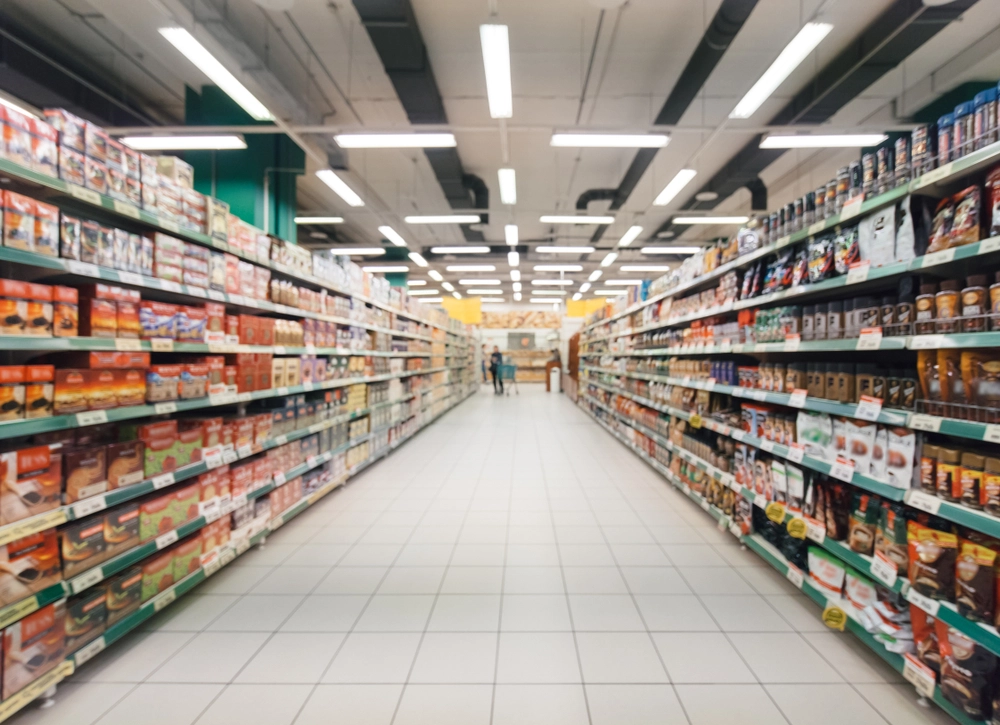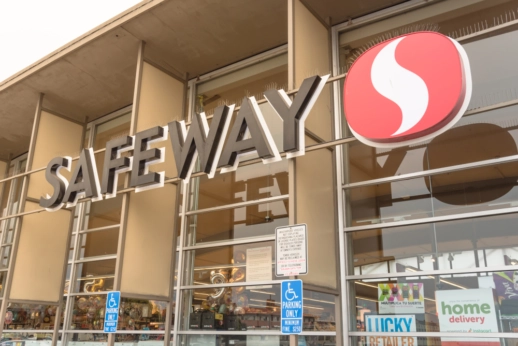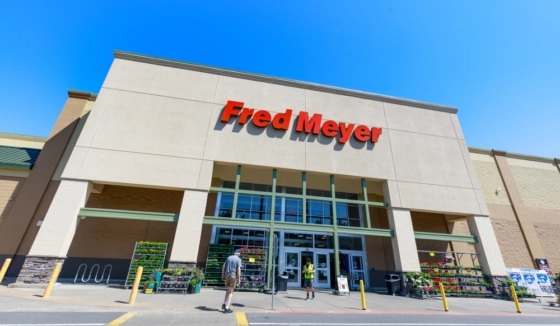How Supermarket Mergers Affect Food Deserts
A proposed merger between Kroger and Albertsons, worth nearly $25 billion, could be completed in 2024. For folks living in food deserts, that could be cause for concern.
How Supermarket Mergers Affect Food Deserts
A proposed merger between Kroger and Albertsons, worth nearly $25 billion, could be completed in 2024. For folks living in food deserts, that could be cause for concern.

Photo via Shutterstock
In the South Cushman neighborhood of Fairbanks, AK, it’s difficult for many residents to shop for food. According to the Department of Agriculture’s food access tool, 109 of its households are low income, tend not to own a car and lack access to a supermarket within half a mile. The snow makes transportation difficult, and the buses do not run on weekends. With Fairbanks experiencing a record snowfall this autumn, residents need to plan carefully when shopping for food.
This is especially true for Shannon Williams, a student at the University of Alaska Fairbanks, as she shops at her neighborhood Safeway on the west side of town. This is the closest option to South Cushman. Williams picks that store mainly for cost savings.
Across the street is a Fred Meyer grocery store. When asked what she thought of both supermarkets falling under one ownership, Williams was concerned. “It’s a bad idea. These are our two options, and Safeway is cheaper. If Fred Meyer owns both, I’m afraid they’ll control the prices.”
Read More
$9 Butter? Canadian Redditors Say No Thank You
Subscribers to a Reddit thread organized a national boycott of grocery mega-chain Loblaws that grew into a community movement to promote farmer’s markets and local food.
The fate of food access in South Cushman turns on a proposed merger between Kroger, which owns Fred Meyer, and Albertsons, which owns Safeway. The Cincinnati- and Boise-based owners announced their $24.6-billion deal in October 2022, hoping to close by early 2024. Reaction to the proposed merger has been mixed, with the Federal Trade Commission (FTC) and some states threatening legal action to stop it. If successful, one company will have control over grocery prices for South Cushman. The same goes for neighborhoods like it across the country. Kroger would own 22 percent of the U.S. food retail market.
Over the past four decades, ownership over retail grocers in the U.S. has concentrated further and further. Four companies—Walmart, Kroger, Costco and Albertsons—own more than half of all grocery sales today. If Kroger goes ahead with its purchase of Albertsons, it would be just three companies that control the majority of all grocery sales in the country.
Food deserts, too, are on an upward trend. The US Department of Agriculture (USDA) has defined urban food deserts as low-income areas where at least one third of the residents live at least one mile from a supermarket. A 2017 report shows that, since 2010, the number of food deserts in the country have increased, with estimates that almost 30 million Americans live in one. Further, 34 million Americans lack access to affordable, healthy food. Grocery corporations often say that consolidation can help counter those problems, but the evidence proves otherwise.

Less competition, higher prices
A spokesperson for Kroger tells Modern Farmer the merger “will mean long-term job security, higher wages, expanded benefits and a strong unionized workforce for associates. The merger will also mean lower prices and more choices for fresh food for customers and more investments in our communities. The alternative is lose-lose, undermining good union jobs and putting our communities at risk of higher prices, fewer options, shuttered stores, and more food deserts.”
It’s a common claim in the industry.
Yet, several studies, including the USDA’s own review, found that consolidating grocery stores results in higher prices in markets that have few options. In a letter sent to the Federal Trade Commission, the Center for Science in the Public Interest (CSPI) states, “there is no evidence the projected efficiencies” in the proposed Kroger-Albertsons merger will pass savings on to consumers. According to Sara John, a senior policy scientist at CSPI, this comports with basic economic principles. “When there is less competition, that leads to higher prices.”
Learn More
On the Ground With Grocery Stores Changing the Way We Shop
This is especially concerning with food prices already at a historic high. Competition between a Fred Meyer on one side of the street and Safeway on the other generally helps consumers. If Kroger and Albertsons merge, a shopper might find their grocery bill changes, even if the stores’ names do not.
We’ve been here before
In a food desert, a significant portion of a neighborhood’s residents lack a supermarket within one mile. That distance cuts access to healthy foods, as low-income folks often lack reliable transportation, especially in difficult weather. The inconvenience alone forces shoppers to choose shelf-stable food, rather than fresh produce.
One study found that “the availability of supermarkets has been associated with more fruit and vegetable intake, more healthful diets and lower rates of obesity.” Kroger and Albertsons state that the merger will “expand access to fresh and affordable food.”
That’s true; supermarkets do provide access to a range of foods. Whether those options are available to low-income neighborhoods, however, depends on their price and store location.
Advocates, legislators and state attorneys general are worried about Kroger closing stores, especially any Albertsons close to an existing Kroger. The FTC, as well as state attorneys general, are currently reviewing the deal under their antitrust authority to ensure that mergers don’t harm consumers. To address those concerns, (as well as other fears of a monopoly), Kroger and Albertsons announced it will instead sell more than 400 of its stores to a third party, C&S Wholesale Grocers.
To some experts, this is cold comfort. Lina Khan, the current head of the FTC, wrote a law review article in 2017 outlining how divesting stores has not solved monopoly concerns.
History gives us a stark example. When Albertsons purchased Safeway in 2017, the FTC signed off on the deal because Albertsons promised to sell stores to a small chain called Haggen. Haggen was ill equipped to take on so many locations, went bankrupt, closed stores and even sold some of them back to Albertsons. As a result, says Khan, “the level of consolidation resulting from this [2017] merger will be greater than what the government has planned and approved.”
The Kroger-Albertsons’ plan has similar issues. In 2017, selling to Haggen failed because it was unable to manage an increase to 164 from 18 stores. Today, selling to C&S will increase their stores to 413 from 160.
Sara John at CSPI is also worried about the disproportionate effect of closures on low-income neighborhoods. She predicts that grocers “will close their worst-performing stores, which has the biggest impact on low-income communities, on average.”
During another merger between Amazon and Whole Foods, there was speculation that Amazon’s capabilities make ordering online easier. However, many low-income folks, especially in Alaska and rural areas, lack reliable internet access to take advantage of delivery options.

Communities respond
Considering the potential harm to consumers, the FTC has an open investigation of the proposed deal. The commission can review mergers for anticompetitive practices, and if it finds problems, it can negotiate with the merging entities to avoid them. If all cannot agree, the FTC can attempt to stop the merger under federal laws that prohibit unfair business practices.
State attorneys general, such as those in Arizona and Washington, are also conducting their own investigations. Nevada has an open survey to take the pulse of consumers. The US Senate will be holding an antitrust panel this month.
Other stakeholders are organizing to stop the merger. For example, a nationwide Stop the Merger coalition brings together consumer protection, privacy and labor advocates, to name a few. One member of the coalition, Katy Milani, is associate director for policy and advocacy at the Institute for Local Self-Reliance. She is calling on the FTC to enforce existing laws. “In the ’50s and ’60s, when the FTC enforced the antitrust laws on the books…independent grocery stores flourished,” Milani told Modern Farmer in an email. “We had a dynamic food ecosystem—we didn’t have food deserts.”
Read More
From Community, For Community: The Rise of the Free Fridge
There are also more local efforts. In Alaska, an effort by the Alaska Public Interest Research Group (AKPIRG) led to the state’s Republican and Independent US senators, as well as its Democratic House representative, to urge the FTC to oppose the merger. Some (no less cold) communities, such as Chicago, are organizing to form publicly owned grocery stores.
Kroger states the merger will conclude in early 2024. To the shoppers outside Safeway in Fairbanks, consolidation often feels out of their hands. Still, movements to slow consolidation are gathering steam. To continue that movement, we have to recognize that consolidation does not, as the grocers claim, create oases.
This story has been updated to include a statement from Kroger.
Follow us
This work is licensed under a Creative Commons Attribution-NoDerivatives 4.0 International License.
Want to republish a Modern Farmer story?
We are happy for Modern Farmer stories to be shared, and encourage you to republish our articles for your audience. When doing so, we ask that you follow these guidelines:
Please credit us and our writers
For the author byline, please use “Author Name, Modern Farmer.” At the top of our stories, if on the web, please include this text and link: “This story was originally published by Modern Farmer.”
Please make sure to include a link back to either our home page or the article URL.
At the bottom of the story, please include the following text:
“Modern Farmer is a nonprofit initiative dedicated to raising awareness and catalyzing action at the intersection of food, agriculture, and society. Read more at <link>Modern Farmer</link>.”
Use our widget
We’d like to be able to track our stories, so we ask that if you republish our content, you do so using our widget (located on the left hand side of the article). The HTML code has a built-in tracker that tells us the data and domain where the story was published, as well as view counts.
Check the image requirements
It’s your responsibility to confirm you're licensed to republish images in our articles. Some images, such as those from commercial providers, don't allow their images to be republished without permission or payment. Copyright terms are generally listed in the image caption and attribution. You are welcome to omit our images or substitute with your own. Charts and interactive graphics follow the same rules.
Don’t change too much. Or, ask us first.
Articles must be republished in their entirety. It’s okay to change references to time (“today” to “yesterday”) or location (“Iowa City, IA” to “here”). But please keep everything else the same.
If you feel strongly that a more material edit needs to be made, get in touch with us at [email protected]. We’re happy to discuss it with the original author, but we must have prior approval for changes before publication.
Special cases
Extracts. You may run the first few lines or paragraphs of the article and then say: “Read the full article at Modern Farmer” with a link back to the original article.
Quotes. You may quote authors provided you include a link back to the article URL.
Translations. These require writer approval. To inquire about translation of a Modern Farmer article, contact us at [email protected]
Signed consent / copyright release forms. These are not required, provided you are following these guidelines.
Print. Articles can be republished in print under these same rules, with the exception that you do not need to include the links.
Tag us
When sharing the story on social media, please tag us using the following: - Twitter (@ModFarm) - Facebook (@ModernFarmerMedia) - Instagram (@modfarm)
Use our content respectfully
Modern Farmer is a nonprofit and as such we share our content for free and in good faith in order to reach new audiences. Respectfully,
No selling ads against our stories. It’s okay to put our stories on pages with ads.
Don’t republish our material wholesale, or automatically; you need to select stories to be republished individually.
You have no rights to sell, license, syndicate, or otherwise represent yourself as the authorized owner of our material to any third parties. This means that you cannot actively publish or submit our work for syndication to third party platforms or apps like Apple News or Google News. We understand that publishers cannot fully control when certain third parties automatically summarize or crawl content from publishers’ own sites.
Keep in touch
We want to hear from you if you love Modern Farmer content, have a collaboration idea, or anything else to share. As a nonprofit outlet, we work in service of our community and are always open to comments, feedback, and ideas. Contact us at [email protected].by Clay Venetis, Modern Farmer
November 22, 2023
Modern Farmer Weekly
Solutions Hub
Innovations, ideas and inspiration. Actionable solutions for a resilient food system.
ExploreShare With Us
We want to hear from Modern Farmer readers who have thoughtful commentary, actionable solutions, or helpful ideas to share.
SubmitNecessary cookies are absolutely essential for the website to function properly. This category only includes cookies that ensures basic functionalities and security features of the website. These cookies do not store any personal information.
Any cookies that may not be particularly necessary for the website to function and are used specifically to collect user personal data via analytics, ads, other embedded contents are termed as non-necessary cookies.
I do not think this merger is a good idea…I do not like so few owning such a large share of the market. It squeezes out others and will spell disaster in the future. Just my opinion.
Economic consideration could be one reason for merger. But at the same time monopoly businesses are not desirable for the community.